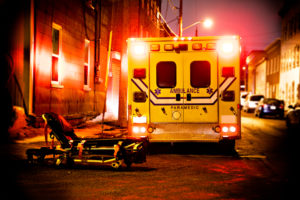Patients fill billions of prescriptions they receive from doctors every year in the United States. In addition, a hospital may distribute different medications to thousands of patients on a daily basis. With such a wide variety of pharmaceuticals in use in the United States, medication errors should surprise nobody. Someone may take the wrong medication for a number of reasons, including:
- A doctor writes the wrong prescription
- A pharmacy fills the wrong prescription
- A hospital nurse or staff member distributes a drug to the wrong patient
When an error by a medical professional or hospital causes injuries, the injured patient may take legal action to recover compensation. If you are taking or plan to take any type of prescription drug, understand the potential injuries that may result if you take the wrong medication.
Drug Allergies
Most of us are allergic to one thing or another—be it dust, grass, peanuts, pollen, and many other possible allergens. Some people may have allergic reactions to certain types of medications. Such allergic reactions are separate from side effects, and pharmaceutical companies may not provide warnings regarding such possible reactions in certain individuals. Every medical professional, therefore, should ask careful questions to discover any potential drug allergies from which their patients may suffer.
Drugs that commonly cause allergic reactions include certain types of antibiotics, medications treating autoimmune diseases, pain relievers, chemotherapy drugs, and more. An allergic reaction can vary widely from one patient to another, with symptoms ranging from annoying to life-threatening. Some allergic reactions may involve:
- Hives, rash, or itching
- Swelling
- Fever
- Wheezing or breathing issues
- Anemia
- Kidney issues
Some patients may experience a life-threatening allergic reaction called anaphylaxis. Anaphylaxis can cause multiple systems to shut down in the body. If you develop any of the following symptoms, always seek immediate medical help:
- Diarrhea or vomiting
- Tight airways
- Abdominal cramps
- Lightheadedness or dizziness
- Faster and weaker pulse
- Decreased blood pressure
- Losing consciousness
- Seizures
Without emergency medical attention, anaphylaxis can prove fatal. Other allergic reactions may also require medical treatments, and you should discuss them with your doctor as soon as possible.
Adverse Drug Interactions
Sometimes, a drug injury does not occur because of a patient’s allergy, but instead because of an interaction with another drug the patient is already taking. Many patients with chronic medical issues or a variety of diseases take numerous drugs every day. Drug interactions can adversely affect a patient in two different ways:
- They may render one or both of the medications ineffective, thereby leaving the patient without the medical benefits, which can cause harm and complications
- They may cause an adverse drug event, which can involve many different reactions, some of which may seem similar to an allergic reaction
- Prescription drugs may not only have bad interactions with other prescriptions, but also over-the-counter medications and even herbal and dietary supplements. The following are only some of the many common adverse drug interactions:
- Statins are a popular drug in the United States, but if a patient takes certain statins with a variety of other drugs, they may suffer an increased risk of rhabdomyolysis, which can lead to kidney failure.
- When a patient takes selective serotonin reuptake inhibitors (SSRIs) with tramadol or similar drugs, they may suffer serotonin syndrome, a potentially life-threatening condition.
- Many people take blood thinners like Warfarin to prevent blood clots and treat other conditions. Never take these drugs with NSAIDs—like over-the-counter or prescription ibuprofen—because they may cause gastrointestinal bleeding. Acetaminophen and prednisone may also cause interactions.
- NSAIDs may also cause increased hypertension in people who take antihypertensive drugs.
- St. John’s wort is an herbal supplement that can alter the effectiveness of many types of conventional pharmaceuticals.
In today’s society, drug interactions are very much preventable. Doctors and pharmacists have software that organizes and easily checks all of a patient’s prescriptions. In addition, all new doctors should always ask for a complete list of a patient’s medications before writing any new prescriptions. If a patient suffers an adverse drug interaction because a doctor failed to take the necessary care, the patient should hold the doctor liable for any resulting injuries and losses.
Wrong Dosage
Many people can also suffer injuries when they take the incorrect dosage of their medications. Both too little and too much medication can harm a patient. Too small of a dose may not provide the benefits the patient needs to control a condition, regulate symptoms, and prevent complications. Too large of a dose can result in numerous effects on the system, including, potentially, a fatal overdose.
Dosage mistakes can happen in different ways. First, the prescribing doctor may make an error on the prescription. It can also occur if a pharmacy makes an error or fails to notice that a doctor’s prescribed dosage may prove harmful. In such cases, a pharmacy should always check with the doctor, who should then realize and correct the error before the patient receives the prescription.
The most common environment for incorrect dosage injuries, however, is the hospital. Inpatients often receive several types of medications that nurses or staff distribute on a schedule. Nurses should always record when a patient receives medication so that someone on the next round does not unnecessarily distribute the same drug. When record-keeping errors take place or a hospital employee simply does not pay attention, a patient may receive a double dose or more without even realizing it—or may fail to receive necessary medication at all.
Identifying when medical malpractice caused a medication error is a complicated process. If you suffered injuries and losses due to medication errors, do not hesitate to discuss a possible legal claim with an experienced medical malpractice attorney who can help protect your rights against negligent medical professionals.













One Comment
Thyrza
Well written, easy to understand and very true.
Comments for this article are closed.